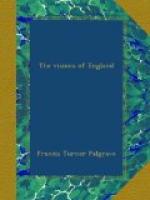Cyprian webs, damask of Arabia mazy with gold:
Sendal and Samite and Tarsien, and sardstones ruddy as wine,
Graved by Athenian diamond with forms of beauty divine.
To the quay from the gabled alleys, the huddled ravines of the town,
Twilights of jutting lattice and beam, the Guild-merchants come down,
Cheapening the gifts of the south, the sea-borne alien bales,
For the snow-bright fleeces of Leom’ster, the wealth of Devonian vales;
While above them, the cavernous gates, on which knight-robbers have gazed
Hopeless, in peace look down, their harrows of iron upraised;
And Dustyfoot enters at will with his gay Autolycus load,
And the maidens are flocking as doves when they fling the light grain on
the road.
Low on the riverain mead, where the dull clay-cottages cling
To the tall town-ward and the towers, as nests of the martin in spring,
Where the year-long fever lurks, and gray leprosy burrows secure,
Are the wattled huts of the Friars, the long, white Church of the poor:
—Haven of wearied eyelids; of hearts that care not to live;
Shadow and silence of prayer; the peace which the world cannot give!
Tapers hazily gloaming through fragrance the censers outpour;
Chant ever rising and rippling in sweetness, as waves on the shore;
Casements of woven stone, with more than the rainbow bedyed;
Beauty of holiness! Spell yet unbroken by riches and pride!
—Ah! could it be so for ever!—the good aye better’d by Time:—
First-Faith, first-Wisdom, first-Love,—to the end be true to their
prime! . .
Far rises the storm o’er horizons unseen, that will lay them in dust,
Crashings of plunder’d cloisters, and royal insatiate lust:—
Far, unseen, unheard!—Meanwhile the great Minster on high
Like a stream of music, aspiring, harmonious, springs to the sky:—
Story on story ascending their buttress’d beauty unfold,
Till the highest height is attain’d, and the Cross shines star-like in
gold,
Set as a meteor in heaven; a sign of health and release:—
And the land rejoices below, and the heart-song of England is Peace.
This date has been chosen as representing at once the culminating point in the reign of Edward, and of Mediaevalism in England. The sound, the fascinating elements of that period rapidly decline after the thirteenth century in Church and State, in art and in learning.
‘In the person of the great Edward,’ says Freeman, ’the work of reconciliation is completed. Norman and Englishman have become one under the best and greatest of our later Kings, the first who, since the Norman entered our land, . . . followed a purely English policy.’
The three children; William I and II, and Henry I.
The transept; of Canterbury Cathedral, after Becket’s death named the ‘Martyrdom.’
Nor again; See the Early Plantagenets, by Bishop Stubbs: one of the very few masterpieces among the shoal of little books on great subjects in which a declining literature is fertile.




